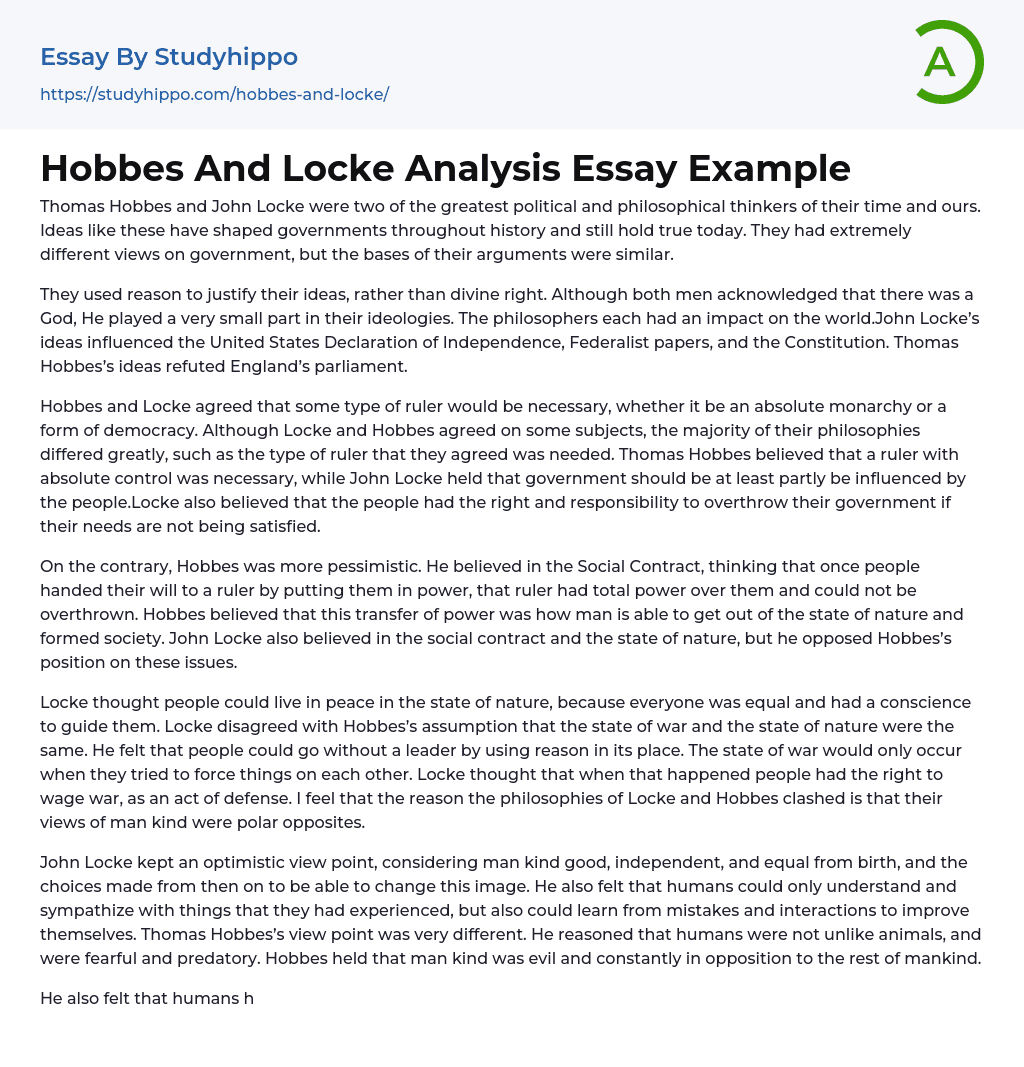Thomas Hobbes and John Locke were two of the greatest political and philosophical thinkers of their time and ours. Ideas like these have shaped governments throughout history and still hold true today. They had extremely different views on government, but the bases of their arguments were similar.
They used reason to justify their ideas, rather than divine right. Although both men acknowledged that there was a God, He played a very small part in their ideologies. The philosophers each had an impact on the world.John Locke’s ideas influenced the United States Declaration of Independence, Federalist papers, and the Constitution. Thomas Hobbes’s ideas refuted England’s parliament.
Hobbes and Locke agreed that some type of ruler would be necessary, whether it be an absolute monarchy or a form of democracy. Although Locke an
...d Hobbes agreed on some subjects, the majority of their philosophies differed greatly, such as the type of ruler that they agreed was needed. Thomas Hobbes believed that a ruler with absolute control was necessary, while John Locke held that government should be at least partly be influenced by the people.Locke also believed that the people had the right and responsibility to overthrow their government if their needs are not being satisfied.
On the contrary, Hobbes was more pessimistic. He believed in the Social Contract, thinking that once people handed their will to a ruler by putting them in power, that ruler had total power over them and could not be overthrown. Hobbes believed that this transfer of power was how man is able to get out of the state of nature and formed society. John Locke also believed in the social contract and th
state of nature, but he opposed Hobbes’s position on these issues.
Locke thought people could live in peace in the state of nature, because everyone was equal and had a conscience to guide them. Locke disagreed with Hobbes’s assumption that the state of war and the state of nature were the same. He felt that people could go without a leader by using reason in its place. The state of war would only occur when they tried to force things on each other. Locke thought that when that happened people had the right to wage war, as an act of defense. I feel that the reason the philosophies of Locke and Hobbes clashed is that their views of man kind were polar opposites.
John Locke kept an optimistic view point, considering man kind good, independent, and equal from birth, and the choices made from then on to be able to change this image. He also felt that humans could only understand and sympathize with things that they had experienced, but also could learn from mistakes and interactions to improve themselves. Thomas Hobbes’s view point was very different. He reasoned that humans were not unlike animals, and were fearful and predatory. Hobbes held that man kind was evil and constantly in opposition to the rest of mankind.
He also felt that humans had an innate motivation to feel pleasure and cause hurt.
- Age Of Enlightenment essays
- Ethos essays
- Time essays
- Acceptance essays
- Meaning Of Life essays
- Reality essays
- Natural Law essays
- Political Philosophy essays
- Utilitarianism essays
- Existence essays
- Free Will essays
- Good And Evil essays
- Confucianism essays
- Relativism essays
- Conscience essays
- Environmentalism essays
- Empiricism essays
- Epistemology essays
- Ethics essays
- Existentialism essays
- Human Nature essays
- Individualism essays
- Metaphysics essays
- Philosophy Of Life essays
- Transcendentalism essays
- Truth essays
- Destiny essays
- Determinism essays
- Fate essays
- Functionalism essays
- Philosophers essays
- Pragmatism essays
- Future essays
- Child Observation essays
- Critical Reflection essays
- Teaching Philosophy essays
- Personal Philosophy essays
- Action Speak Louder Than Words essays
- Can Money Buy Happiness essays
- Values of Life essays
- Ethical dilemma essays
- Normative Ethics essays
- Virtue Ethics essays
- Belief essays
- Deontology essays
- Moral essays
- Virtue essays
- Work Ethic essays
- Henry David Thoreau essays
- Carl Jung essays




